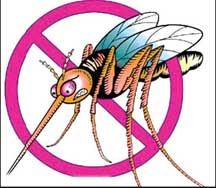|
Public warned to be extra-vigilant:
Heightened dengue threat
Ridma DISSANAYAKE
* Mosquitoes now breeding in wells
* Sting time too extended
The Health Ministry yesterday warned the public to be extra vigilant
concerning the dengue epidemic following new evidence showing the dengue
mosquito had taken to breeding inside domestic wells in addition to its
normal breeding sources of used receptacles, overhead gutters and
discarded tyres .

“The Health Ministry had made the public aware only about water
storage containers as mosquito breeding places.
The ministry’s Research Entomological Unit has revealed that dengue
mosquitoes have changed their life pattern to counter steps taken for
their eradication and have begun laying eggs in wells,” a ministry
spokesman said.
The highest dengue mosquito breeding source in the Eastern Province
(46 percent) is found to be wells. Mosquitoes are mostly using wells
with cement walls to lay eggs.
The Health Ministry has informed the public to breed small fish
species in wells to destroy the eggs of dengue mosquitoes, the spokesman
said.
He said the public have also been informed the dengue mosquito which
was said to be more active from 6am to 10am and from 4pm to 6.30 pm has
extended its stinging period to 11pm according to the same research.
Health Ministry entomological surveys have revealed the dengue
mosquito is a double breeder and is most powerful of all mosquitoes.
According to sources there are more than 2,500 species of mosquitoes
worldwide and Sri Lanka is home to 250 such species . Mosquitoes belong
to a group of insects that require blood to develop fertile eggs. All,
except the dengue mosquitoes, take the blood of all animals and humans.
But the dengue mosquito only draws on human blood to help develop
fertile eggs.
Dengue mosquitoes have a life span of one month and lay eggs four
times during their lifetime. They bite humans more than once. Other
mosquitoes have only a one week life span and lay eggs only once. They
also bite humans only once. Accordingly, a single dengue mosquito has
the ability to spread dengue among a number of persons.
The Health Ministry entomological surveys have revealed that dengue
mosquitoes have changed their life patterns resulting in the increased
breeding of the dengue mosquito.
The ministry spokesman warned the public to be more careful
considering the new developments concerning the dengue mosquito.
|



